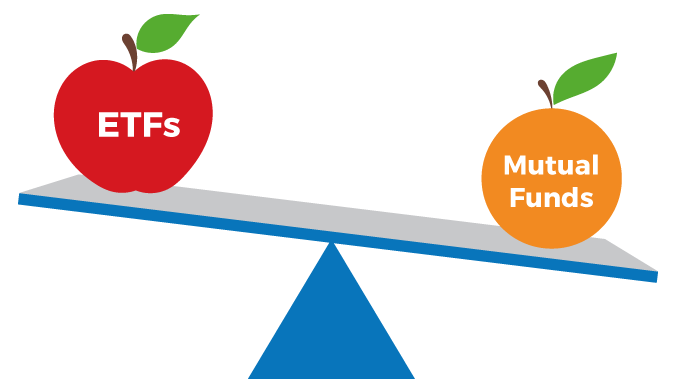If you are like most people, you probably use the terms ETFs And Mutual Funds interchangeably. It’s not your fault – as a concept, they are essentially the same. However, there are places where they differ, albeit slightly. Mutual funds and Exchange traded funds (ETF) are broad concepts, but let us have a comparison of specifically index funds and index ETFs.

Firstly, they are both passive investing instruments. Conceptually, they are the same.
However there are structural differences between the two that you need to know:
- An index fund is similar to any other mutual fund investment. But it differs from an active fund, because it does not create alpha but only reduces and minimizes tracking error. In case of index ETFs too, the focus is on minimizing the tracking error and reducing the cost of the funds.
- Since index funds are open-ended, they are open to purchase and redemption at any time. On the other hand, Index ETFs don’t do any sale or purchase- these transactions are between buyers and sellers in the market.
- When it comes to the number of units and AUM of the index funds and mutual funds, they keep changing. However, the number of units and AUM of the index ETFs do not change because they are close ended. And once the NFO is closed, other than the value accretion there is no further addition to the corpus.
- Mutual funds issue units which are valued after adjusting the TER or total expense ratio. Meanwhile ETFs trade in the fractional shares of the underlying commodity or index.
- When we talk about operational process flow- buying index fund units from an AMC increases the AUM of the fund, which reduces when you redeem it. Whereas in case of index ETFs, you can buy or sell only if there is liquidity in the market.
- An index fund purchase or redemption is executed at the end-of-day NAV. NAV stands for Net Asset Value which is based on the market value of all stocks adjusted for the TER or total expense ratio on a daily basis. On the other hand, in case of index ETFs, prices fluctuate and vary in real time.
- Index ETFs in India cost much lower than index funds. While index funds have an expense ratio of about 1%, index ETFs have an expense ratio of 0.35%. Even with factors like brokerage and statutory charges, index ETFs are more affordable.
- Another difference is that Systematic Investment Plans [SIPs] can be structured in an index fund. SIPs provide rupee-cost averaging that lowers the average cost of owning the units. Index ETFs do not support SIPs because they are close ended.
- Another ETF vs Mutual fund point is that ETFs also provide another benefit, that they can be leveraged as short or long leveraged products. This isn’t possible when it comes to mutual funds, and definitely not available in the Indian market.
So this is how Mutual funds differ from ETFs. Now that you know the difference, you can choose to invest in mutual funds or go for ETFs and make an informed choice.

